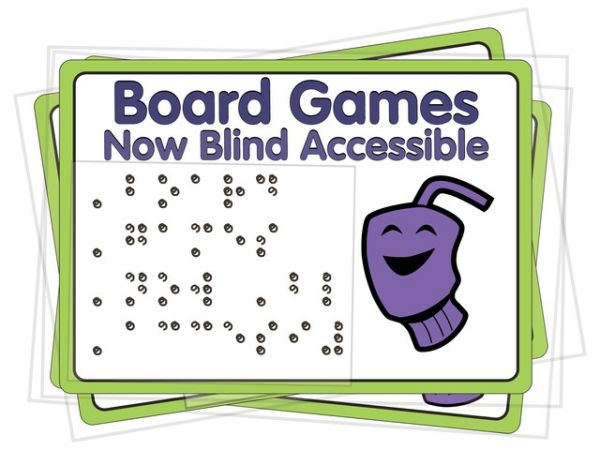Board Games for the Blind: The Evolution of Accessibility

Independence is defined, roughly, as being able to do what you want, when you want, the way you want. When it comes to board gaming, this has been an impossibility for the blind and visually impaired communities for far too long. Players are stuck relying on friends and family to make the decisions for them. For the most part, it’s the decision making that makes a game. 64 Oz. Games is working to make games more accessible so blind and visually impaired players can be independent for the first time.
64 Oz. Games is currently running a Kickstarter campaign that will bring blind people to the game table on equal footing. Richard and Emily Gibbs are sighted individuals who are experts in gaming and blindness. Emily is a teacher of blind students and Richard is a board game lover who knows braille himself.
Their company will sell accessibility kits that can be purchased as add-ons to games. Their Kickstarter started off small, asking for funds to purchase an embosser (Braille printer). This will let them produce Braille stickers that can be added to sleeves, opening up hundreds of card games. Cards with too much text can be made accessible with other technology, such as QR codes (enabling text-to-speech via headphones) or simple work-arounds like reference sheets. All of these add-ons are produced on a Print-On-Demand basis. Most groups might only have one blind player — these accessibility kits will allow blind players to access the game while having minimal impact on sighted players.
64 Oz. Games hopes to support as many games as possible through their online store after the Kickstarter campaign closes. The initial selection of accessible games will include Coloretto, Love Letter, Dominion, Munchkin, Tichu, Tiny Epic Kingdoms, 7 Wonders, and For Sale. They then hope to expand their catalog to provide blind gamers with more options and ultimately something that they have been lacking for years: choice in games.
The campaign has already reached its first funding goal. The campaign’s stretch goals will allow for production of Braille dice for specific games and RPGs. After that, they hope to start making things like transparent overlays for boards which would allow them to produce accessibility kits for the vast majority of tabletop games.
Even though the campaign is for a good cause, no one expects backers to support the project without a reward. Richard and Emily have designed a tactile microgame, Yoink!, that appeals to both sighted and blind players. Because this game is played with eyes shut, both blind and sighted players will have very similar experiences. Another bonus that backers will receive is a documentary showing the process that a game goes through from start to finish in becoming an accessible title. The Kickstarter campaign will be running through April 24, 2014, and can be found at https://www.kickstarter.com/projects/64ouncegames/board-games-now-blind-accessible.




